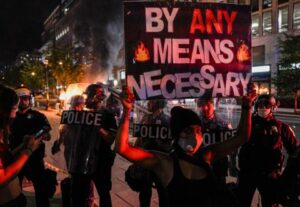
Today is Pentecost, and this morning in worship we celebrated the coming of the Holy Spirit on the disciples in wind and fire, and in the transformation of language. In her sermon, Bishop Mary called us to reflect on how we can live out the stories of our faith in the here and now, not just in our memories.
This week, the world has watched in horror as many major American cities have been taken over by uprisings in response to the killing of George Floyd, a Black American man, by police. The stories of who is doing what, in terms of violence and property damage, are complex, doubtful, and ever-changing. However, even if it is members of the affected communities who are rioting (and it’s pretty clear, at the very least, that not all of the rioting is coming from these communities), it is perhaps not terribly surprising that people who have been demonstrating peacefully for years and decades, without noticeable results, may feel the need to escalate to get the attention of those in power.
I have been deeply encouraged by the conversation in our Evening Prayer services about these events; while we pray for an end to violence and destruction, those who are participating also understand that there can be no peace without justice, and without change; and that those of us with white skin need to step up and do the work of this change and reconciliation.
But how do we do that work in a pandemic? There was a demonstration this afternoon in the centre of Montreal, which I strongly considered attending but eventually decided for a variety of reasons was simply not a risk I could take. Normally, to go to a protest downtown, I would take the Metro, but that’s something we’ve been warned against doing unless it’s absolutely necessary. Congregating with large numbers of people, even masked, almost certainly constitutes exposure to the virus. And then there’s the danger that if things get out of hand, I could come to the attention of the authorities at a time when my visa status is under review, and/or be detained away from my child.
On one level, these are responsible things to consider. But on another level, they’re excuses. The people in the neighbourhoods in Minneapolis whose houses, businesses, and places of worship are being destroyed and whose friends, brothers, sons, and husbands are being killed, don’t have a choice about whether their lives are disrupted and their survival on the line (and they already belong to groups that are disproportionately affected by the pandemic). It is a mark of my privilege that I can decide whether to take part in the protest here, or to turn away.
There are, of course, many other ways to support the movement for justice and equality: contacting leaders; donating money; educating ourselves about the history of structural racism and oppression in North America. But if we are to live into our stated commitment to “reconciliation”, as a community, we must eventually decide how we will do so – as individuals and as a congregation – and how much we are willing to risk.
Canada has its own ugly history of violence and injustice against nonwhite people, from the residential schools to the ongoing disputes over pipelines in the West. There is plenty of work for us to do right here. And I know that the people of All Saints by the Lake are generous, intelligent, open hearted, and genuinely seeking to do God’s will in the world. How – both while social distancing lasts, and beyond – do you think we should take action?
On Pentecost, the world is transformed in wind and fire, and people who had not understood each other suddenly speak the same language. This process is not always neat, or comfortable, or appealing. But it is necessary. May we discern in prayer where the Spirit is leading us toward justice and peace.
Leave a Reply